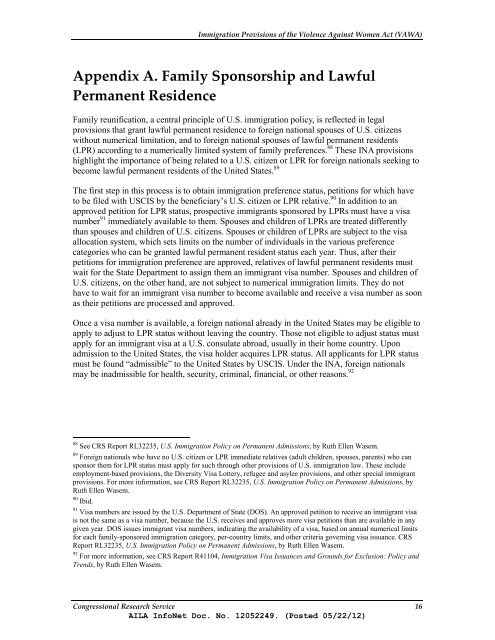Immigration Provisions of the Violence Against Women Act (VAWA)
Immigration Provisions of the Violence Against Women Act (VAWA)
Immigration Provisions of the Violence Against Women Act (VAWA)
Create successful ePaper yourself
Turn your PDF publications into a flip-book with our unique Google optimized e-Paper software.
<strong>Immigration</strong> <strong>Provisions</strong> <strong>of</strong> <strong>the</strong> <strong>Violence</strong> <strong>Against</strong> <strong>Women</strong> <strong>Act</strong> (<strong>VAWA</strong>)<br />
Appendix A. Family Sponsorship and Lawful<br />
Permanent Residence<br />
Family reunification, a central principle <strong>of</strong> U.S. immigration policy, is reflected in legal<br />
provisions that grant lawful permanent residence to foreign national spouses <strong>of</strong> U.S. citizens<br />
without numerical limitation, and to foreign national spouses <strong>of</strong> lawful permanent residents<br />
(LPR) according to a numerically limited system <strong>of</strong> family preferences. 88 These INA provisions<br />
highlight <strong>the</strong> importance <strong>of</strong> being related to a U.S. citizen or LPR for foreign nationals seeking to<br />
become lawful permanent residents <strong>of</strong> <strong>the</strong> United States. 89<br />
The first step in this process is to obtain immigration preference status, petitions for which have<br />
to be filed with USCIS by <strong>the</strong> beneficiary’s U.S. citizen or LPR relative. 90 In addition to an<br />
approved petition for LPR status, prospective immigrants sponsored by LPRs must have a visa<br />
number 91 immediately available to <strong>the</strong>m. Spouses and children <strong>of</strong> LPRs are treated differently<br />
than spouses and children <strong>of</strong> U.S. citizens. Spouses or children <strong>of</strong> LPRs are subject to <strong>the</strong> visa<br />
allocation system, which sets limits on <strong>the</strong> number <strong>of</strong> individuals in <strong>the</strong> various preference<br />
categories who can be granted lawful permanent resident status each year. Thus, after <strong>the</strong>ir<br />
petitions for immigration preference are approved, relatives <strong>of</strong> lawful permanent residents must<br />
wait for <strong>the</strong> State Department to assign <strong>the</strong>m an immigrant visa number. Spouses and children <strong>of</strong><br />
U.S. citizens, on <strong>the</strong> o<strong>the</strong>r hand, are not subject to numerical immigration limits. They do not<br />
have to wait for an immigrant visa number to become available and receive a visa number as soon<br />
as <strong>the</strong>ir petitions are processed and approved.<br />
Once a visa number is available, a foreign national already in <strong>the</strong> United States may be eligible to<br />
apply to adjust to LPR status without leaving <strong>the</strong> country. Those not eligible to adjust status must<br />
apply for an immigrant visa at a U.S. consulate abroad, usually in <strong>the</strong>ir home country. Upon<br />
admission to <strong>the</strong> United States, <strong>the</strong> visa holder acquires LPR status. All applicants for LPR status<br />
must be found “admissible” to <strong>the</strong> United States by USCIS. Under <strong>the</strong> INA, foreign nationals<br />
may be inadmissible for health, security, criminal, financial, or o<strong>the</strong>r reasons. 92<br />
88 See CRS Report RL32235, U.S. <strong>Immigration</strong> Policy on Permanent Admissions, by Ruth Ellen Wasem.<br />
89 Foreign nationals who have no U.S. citizen or LPR immediate relatives (adult children, spouses, parents) who can<br />
sponsor <strong>the</strong>m for LPR status must apply for such through o<strong>the</strong>r provisions <strong>of</strong> U.S. immigration law. These include<br />
employment-based provisions, <strong>the</strong> Diversity Visa Lottery, refugee and asylee provisions, and o<strong>the</strong>r special immigrant<br />
provisions. For more information, see CRS Report RL32235, U.S. <strong>Immigration</strong> Policy on Permanent Admissions, by<br />
Ruth Ellen Wasem.<br />
90 Ibid.<br />
91 Visa numbers are issued by <strong>the</strong> U.S. Department <strong>of</strong> State (DOS). An approved petition to receive an immigrant visa<br />
is not <strong>the</strong> same as a visa number, because <strong>the</strong> U.S. receives and approves more visa petitions than are available in any<br />
given year. DOS issues immigrant visa numbers, indicating <strong>the</strong> availability <strong>of</strong> a visa, based on annual numerical limits<br />
for each family-sponsored immigration category, per-country limits, and o<strong>the</strong>r criteria governing visa issuance. CRS<br />
Report RL32235, U.S. <strong>Immigration</strong> Policy on Permanent Admissions, by Ruth Ellen Wasem.<br />
92 For more information, see CRS Report R41104, <strong>Immigration</strong> Visa Issuances and Grounds for Exclusion: Policy and<br />
Trends, by Ruth Ellen Wasem.<br />
Congressional Research Service 16<br />
AILA InfoNet Doc. No. 12052249. (Posted 05/22/12)







